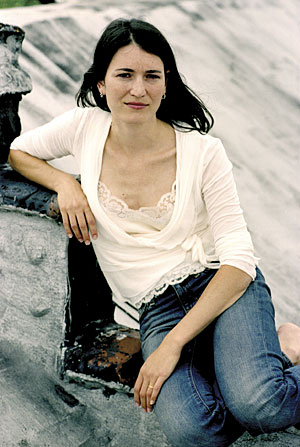Authors Nicole Krauss, Kiyo Sato win 2008 Saroyan Prize
Two very different female writers are this year's recipients of the third William Saroyan International Prize for Writing (also known as the Saroyan Prize). Stanford University Libraries, in partnership with the William Saroyan Foundation, announced the winners during a Sept. 5 ceremony at Stanford.
This year's award honors an acclaimed 30-something New Yorker and an octogenarian Californian. Nicole Krauss, a Stanford alumna, has been awarded the fiction prize for The History of Love. Kiyo Sato has won the nonfiction prize for Dandelion Through the Crack, her first book. Each will receive $12,500.
The other fiction finalists were Pamela Erens for The Understory and Richard Lange for Dead Boys. The other non-fiction finalists were John Moir for Return of the Condor and Adam David Miller for Ticket to Exile: A Memoir.
The 2008 Saroyan Prize received more than 230 qualified entries, a record number.
The biennial Saroyan Prize was established to encourage new and emerging writers, and to honor the literary legacy of the Pulitzer and Academy Award-winning writer William Saroyan (1908-81). This year, the award coincides with centennial celebrations on the anniversary of the writer's birth.
Krauss's The History of Love won France's Prix du Meilleur Livre Étranger and was Amazon's No. 1 Book of the Year; it was short-listed for the Orange, Médicis and Femina prizes. Her first novel, Man Walks Into a Room, was a finalist for the Los Angeles Times Book of the Year. Her fiction has been published in The New Yorker, Harper's, Esquire and Best American Short Stories. In 2007, she was selected as one of Granta's Best Young American Novelists.
Krauss, who was in Italy when the award was announced, recalled Stanford in a statement read at the ceremony: "Those years—my years at Stanford—gave me a sense of all that was possible. It was here, through wonderful professors and friends, that I was introduced to books that had an almost violent effect on me, blowing open whole new ways of thinking and living, and, inevitably, writing."
She said a good library is essential for any writer, and so she also thanked Green Library: "Having been pointed in the right direction—the direction of Beckett, Zbigniew Herbert, Italo Calvino, Bruno Schulz, Borges, Auden and on so many others—all that was really left for me to do was to follow the trail and, in the end, strike out on my own.
"Lurking at a late hour among the stacks, putting off research for a paper by losing myself in a book of poems, I never could have imagined that one day this same library would award me as a young novelist."
Krauss, BA '96, MA '96, is married to Jonathan Safran Foer, whose novel Everything Is Illuminated received the first Saroyan Prize for fiction in 2003.
Sacramento-born Sato was honored for her memoir of her family's history through the Depression, wartime emergency, internment in Poston Camp II in the Arizona desert and life afterward as they struggled against oppressive prejudice and worked to recover from near-total loss. Her father's folk tales and haiku are woven into the work, which The Atlantic Monthly's James Fallows called "moving and graceful … a powerful, thought-provoking historical document."
Sato, accepting the award in person, recalled a setting very different from Green Library for her inspiration: the local doughnut shop, where she "wrote every single morning."
She said that she has spoken to "thousands and thousands" of students about her family's experiences and typically is asked, "'How come you guys didn't hire a lawyer?' 'Why didn't you riot?' If we had rioted, I wouldn't be here to tell about it. The Nisei saw what the Issei went through—tremendous, tremendous discrimination."
The title of her book, she said, comes from a haiku written by her father, which she translated: "Dandelion, you have been stepped upon for so long. Today, you bloom."
At 85, she described herself as an "elegant white dandelion puffball—anytime now the breeze is going to waft my seeds."
Biographies of all Saroyan Prize finalists are available at http://library.stanford.edu/saroyan.
The prize categories are literary fiction, including novels, short story collections and drama, and literary nonfiction, particularly works that follow in the Saroyan tradition of memoirs, portraits and excursions into neighborhood and community.
This year's fiction judges were Geoffrey Burn, director of Stanford University Press; author Bo Caldwell (The Distant Land of My Father); and Hans Ulrich Gumbrecht, the Albert Guérard Professor in Literature at Stanford.
The nonfiction judges were Keith Devlin, executive director of the Center for the Study of Language and Information at Stanford; clinical psychologist Ginger Rhodes; author Richard Rhodes (The Making of the Atomic Bomb); and Hank Saroyan, a writer, performer and nephew of William Saroyan. More information on the judges can be found at http://library.stanford.edu/saroyan/judges.html.



Share This Story